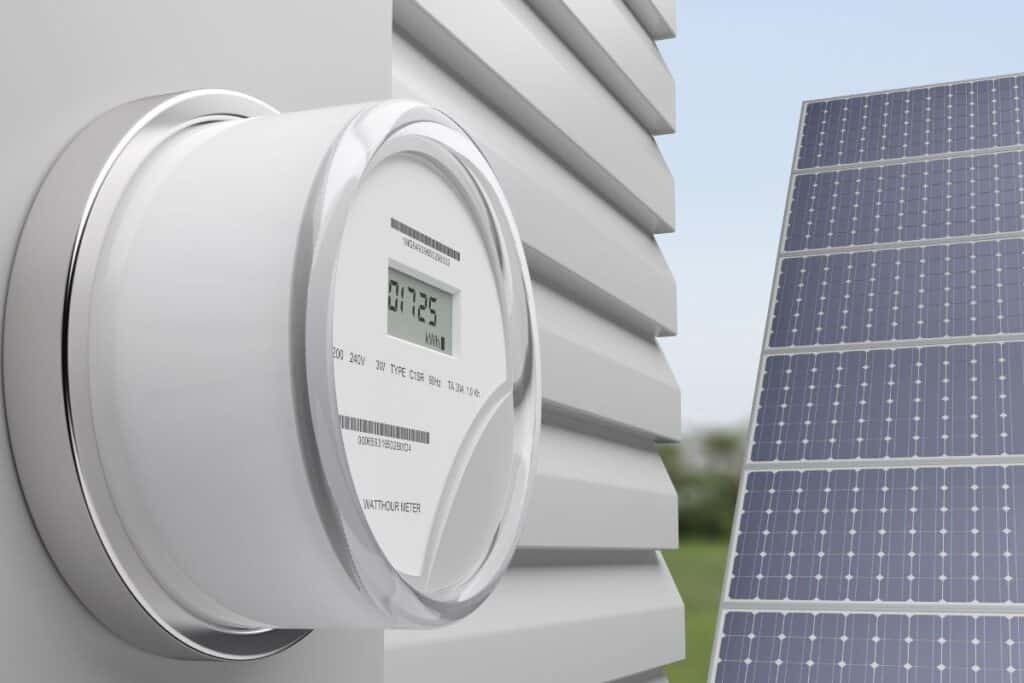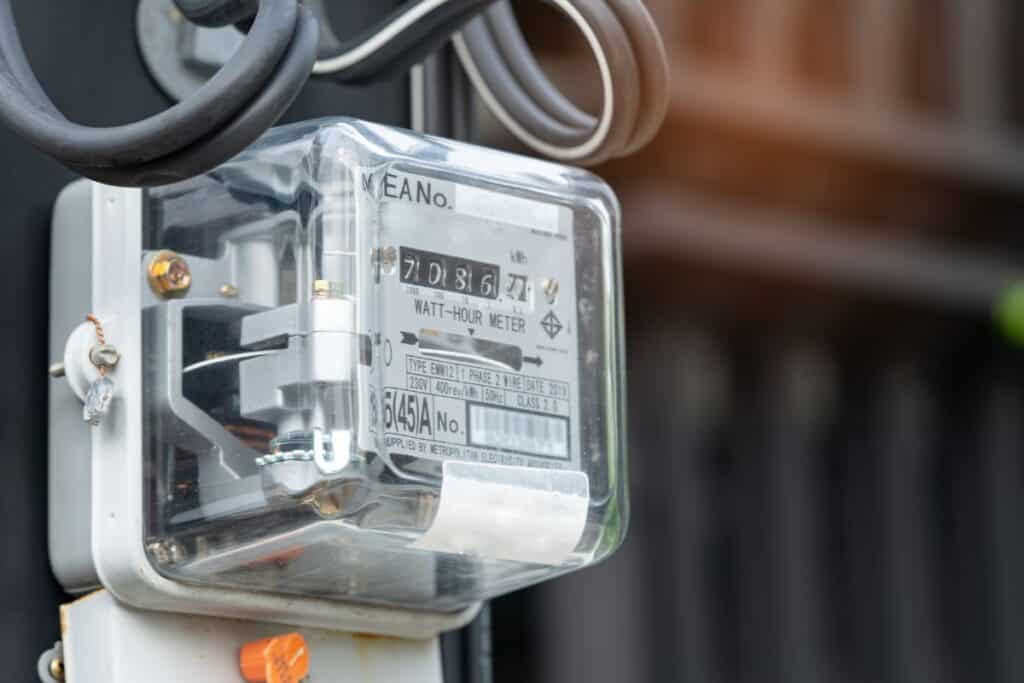Are you intrigued by the concept of “net metering” but feel a little lost in the jargon? Let’s dive into everything you need to know about net metering. For starters, what is net metering?
Net metering is a billing arrangement that allows homeowners and businesses who generate their own electricity using solar panels or other means, to sell excess power back to the grid. It’s an innovative way to incentivize green energy production and promote sustainable living.
Net metering came into being with the rise of renewable energy systems, especially solar power.
As residential and commercial solar installations started producing surplus power, a system was needed to handle this extra energy. Net metering was the solution.

How does net metering for solar power work?
The mechanism is quite simple: When your solar panels produce more electricity than you need, the excess goes back into the power grid, effectively turning your electric meter backwards.
This ‘gives’ you credits that you can use later, typically on cloudy days or during the night when your panels aren’t producing as much electricity.
Let’s say, for example, your solar system produces 50 kilowatt-hours (kWh) of electricity on a sunny day, but you only consume 30 kWh. The remaining 20 kWh are sent back to the grid.
Your utility company ‘banks’ these for you, and you can use them at a later date, like at night when the panels are dormant.
This is a one-to-one trade – for every kilowatt-hour you feed into the grid, you get one back at no additional charge.
What are the benefits of net metering?
Net metering has several benefits. For one, it allows solar power users to maximize the use of the electricity they generate. It also reduces reliance on the grid, which can be beneficial in case of power outages or during peak usage times when electricity rates are high.
Additionally, by sending excess power back to the grid, you’re helping to reduce the overall demand for power from traditional, often environmentally harmful, sources.
The availability of net metering varies greatly by region and utility company.
Some states have mandatory net metering laws that require utility companies to offer it, while others do not.
Likewise, some utilities may have a cap on the total amount of net metered power they will accept.
It is therefore essential to check with your local utility company and familiarize yourself with your area’s policies before installing a solar system with the expectation of net metering.
Moreover, the compensation for excess power also varies.
While some utilities offer full retail rate credits, others might provide less. In recent years, some states have seen contentious debates about the future of net metering, with utilities arguing it shifts the costs of grid maintenance to non-solar customers.
As a result, a few have begun to replace net metering with other compensation mechanisms.
Despite these challenges, net metering remains a significant incentive for going solar. It not only makes installing a solar power system more economical but also allows individuals and businesses to play a role in promoting cleaner, greener energy for everyone.
Net metering might sound complicated initially, but its basic principle is quite simple – it’s all about giving and taking. You give unused power to the grid when you have a surplus, and take when you need it.
That’s net metering in a nutshell.

The Major Advantages of Net Metering
So, now that we’ve introduced the concept of net metering, let’s delve deeper into its key advantages. You might be wondering, “What’s in it for me with this whole net metering thing?”
Net metering is a game changer as it offers several noteworthy benefits to solar power users.
It’s not just a billing mechanism, but a step towards sustainable living and energy independence.
Diving into the details, the major advantages of net metering are numerous.
To start, it provides a way to monetize surplus power. Instead of wasting the extra electricity your solar panels generate, you can feed it back to the grid and earn credits.
This can significantly reduce your electricity bill, and in some cases, may even result in a negative bill if you produce more energy than you consume.
Another key benefit is that net metering effectively turns your home into a mini power plant.
Your solar panels generate electricity during the day, feeding any excess back to the grid, and at night, when your panels aren’t producing, you can draw the equivalent amount of power back from the grid.
This ensures that you have a steady power supply around the clock without needing to invest in costly energy storage systems.
Net metering also promotes energy independence. By generating your own electricity and using the grid as a sort of battery, you’re less reliant on utility companies and less affected by changes in energy prices.
This can provide a sense of security and control over your energy usage and costs.
Additionally, net metering contributes to the greening of the power grid. By exporting solar power back to the grid, you’re reducing the overall demand for energy from traditional, often polluting, power plants.
This helps to reduce carbon emissions and combat climate change. So, you’re not only saving money but also doing your part for the environment.
Finally, net metering supports the local economy. As more people install solar systems to take advantage of net metering, there’s likely to be an increase in local jobs in the solar industry.
This includes roles in manufacturing, installation, maintenance, and more.
In sum, net metering offers a win-win situation for consumers and the environment.
While it enables you to save on your energy bills and become more energy independent, it also aids in the transition towards a cleaner, more sustainable energy future.
Which states in the US have net metering and which don’t
Having understood what net metering is and its associated advantages, let’s explore its availability across the United States.
Net metering policies vary widely across the U.S. as these are typically determined by state and local regulations. It’s important to note that the presence of a net metering policy doesn’t guarantee its effectiveness, as the specific details and benefits can vary significantly.
A majority of U.S. states have some form of net metering policy in place. These include California, Colorado, Connecticut, Delaware, Hawaii, Illinois, Maryland, Massachusetts, New Hampshire, New Jersey, New Mexico, New York, Ohio, Oregon, Pennsylvania, Rhode Island, Utah, Vermont, and Washington among others.
These states have policies that allow for full retail credit for exported solar power, which is the most beneficial form of net metering for solar customers.
However, some states have adopted alternative compensation methods that differ from traditional net metering.
These include states like Arizona and Nevada, where they’ve transitioned to a system of value of solar tariffs or net billing, which may or may not offer the same level of benefit.
On the other hand, there are a few states that have no mandatory net metering policy in place. These include states like South Dakota, Alabama, and Tennessee.
Some of these states may have voluntary programs offered by utilities, but the compensation for exported solar power is typically less than the retail electricity rate.
It’s crucial to remember that this information is subject to change as the regulatory environment for solar energy and net metering continues to evolve.
For the most current information, consider checking resources such as the Database of State Incentives for Renewables & Efficiency (DSIRE) or consult with a local solar installation professional.
In summary, while net metering is widely available across the U.S., the specific policies and their benefits vary considerably from state to state.
Therefore, it’s essential to familiarize yourself with your state’s current policy to understand how it might impact your solar energy investment.

The Alternatives To Net Metering in Solar Energy Systems
Perhaps you live in a region where net metering isn’t an option. Don’t worry, there are still ways to benefit from your solar energy system.
There are several alternative strategies to net metering that can provide benefits to solar energy users. While net metering has been the go-to method for handling excess solar energy, policy changes and technological advancements have led to the rise of alternative methods.
One prominent alternative is the use of solar batteries. Solar batteries store excess power produced by your solar panels for use when your panels aren’t producing enough electricity, such as during the night or on cloudy days.
This essentially turns your property into a self-sustaining unit, reducing or eliminating your reliance on the grid. Batteries can be an excellent option, especially with dropping prices and increasing efficiency, but their upfront cost can be high, and they require regular maintenance.
Feed-in tariffs represent another approach. Unlike net metering, which involves a two-way flow of electricity, feed-in tariffs involve selling all the solar power you generate to the grid at a fixed rate, and then buying back what you need at the standard rate.
This can provide a steady revenue stream, but the effectiveness depends on the tariff rate, which varies by region.
Another option is to participate in a community solar program.
In this arrangement, you buy a share of a larger solar farm located in your area. The electricity produced by your share of the community solar project is credited to your electricity bill, reducing the amount you owe to your utility company.
Finally, there are solar renewable energy certificates (SRECs). In certain states, for every megawatt-hour of solar electricity your system produces, you earn one SREC. You can then sell these SRECs to utility companies, which need them to meet renewable energy requirements set by the state.
Choosing the right strategy depends on various factors, including your region’s solar policies, the size and orientation of your solar panel system, your electricity consumption patterns, and your budget.
